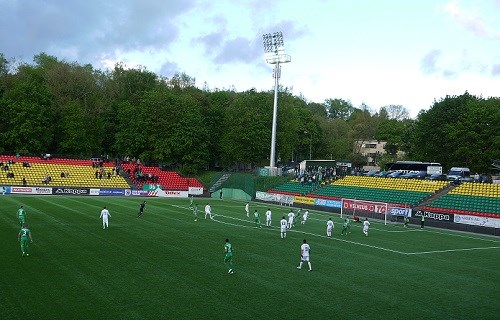More money to the same old clubs - Champions League Diversity Index 2015/2016

Lithuania is one of 22 UEFA members to be represented by exactly the same club in the 2015/16 Champions League as the previous season. The country’s representative will again be Zalgiris playing here in green against Spyris in a recent A-Lyga game. Photo: Steve Menary 2015
22.06.2015
By Steve MenaryUEFA has drastically increased the amount of money being distributed to clubs taking part in its competition and €1.25 billion will be distributed amongst participants in the 2015/16 Champions League, which will see seven new clubs take part for the first time. The amount of new clubs taking part in the Champions League is up from five in the previous season, but still well below the nine debutants in 2013/14, and the 11 new clubs that took part in 2012/13.
Play the Game’s research covers the period from 1994/95, when major structural changes helped create the modern Champions League, up to the forthcoming season. The Diversity index covers 52 of UEFA’s 54 members. Liechtenstein does not enter a club into the Champions League, while Gibraltar has only done so for two seasons.
22 of the 52 countries represented by the same club as last season
Greece has the least diversity. Since 2008/09, Panathaniakos and Olympiakos have taken 14 of the 16 Champions League places on offer to Greece. Of the 78 clubs due to take part in the 2015/16 Champions League, 43 were also involved in the previous season, while 22 countries will be represented by exactly the same club as last season.
The longest-standing period of hegemony is in Croatia, where Dinamo Zagreb has taken the country’s only Champions League place since 2006/07, but there are other examples of UEFA prize money helping to fuel domestic domination.
BATE Borisov has been the sole representative of Belarus for nine seasons now, while Partizan Belgrade takes Serbia’s only place for an eighth season in row and Maribor and Skenderbeu represent Slovenia and Albania for fifth successive seasons.
The highest profile new entrant is Ghent, which after winning Belgium’s Jupiler Pro League for the first time in 2014/15, goes straight into the group stages. Other clubs making their debut in the Champions League in 2015/16 include Danish side Midtjylland and Trencin of Slovakia.
Outside of this trio, the rest of the other new clubs are unlikely to qualify for or participate in the group stages and access UEFA’s largesse, which includes a group stage fee of €12 million with €1.5 million prize money for every win and €500,000 per draw on top.
Up to €75 million in prize money
If the winners of the 2015/16 Champions League comes from a country where clubs are likely to feature regularly on television, such as England or Spain, the winners could earn up to around €75 million just in prize money according to some estimates. However, the riches on offer further down the European football ladder can be proportionately larger.
According to UEFA benchmarking reports, club revenue in San Marino is below €250,000 a year but the country’s new champions, Folgore Falciano, will receive €450,000 from UEFA even if the side lose both matches or do not even score.
That is because under UEFA’s new system, clubs taking part in the very first qualifying round get €200,000 simply for taking part. On top of this money, a club that won their domestic league title but that are then eliminated in the Champions League qualifiers, get another €250,000.
Of the 53 clubs taking part in the qualifying rounds that precede the group stage, 38 won their most recent national league to gain access to the Champions League qualifiers.
The three other 2015/16 Champions League debutants - Stjarnan from Iceland, Georgia’s Dila Gori from Georgia and Milsami Orhei from Moldova - all come from countries where increased UEFA prize money can have a big impact.
After being admitted to UEFA in 2013, Gibraltar were entitled to enter a club in the Champions league qualifiers from 2014/15. The same club, Lincoln Red Imps, had won the last 10 titles in a largely amateur league and has since represented Gibraltar in their only two seasons of Champions League participation.
The knock-on effect is that players with full international caps for Gibraltar are now believed to be getting upwards of £1,000 a month, as clubs in the tiny British Overseas Territory look to challenge Lincoln’s dominance and gain access to UEFA’s increased largesse.





